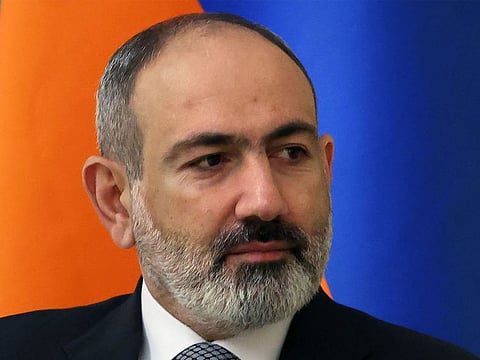Azerbaijan forces trying to advance into Armenia: Yerevan
Fighting erupted overnight along the volatile border between the Caucasus neighbours

Yerevan: Armenia appealed to world leaders for help on Tuesday, saying that Azerbaijani forces were trying to advance onto its territory amid deadly clashes along the arch foes' shared border.
Fighting erupted overnight along the volatile border between the Caucasus neighbours, leaving troops dead on both sides, defence ministries in Baku and Yerevan said, without giving the number of casualties.
The escalation marked the latest flare up since the end of the 2020 war between Yerevan and Baku over the contested Nagorno-Karabakh region.
"Azerbaijani forces continue using artillery, trench mortars, and drones... striking military and civilian infrastructure. The enemy is trying to advance (into Armenian territory)," Armenia's defence ministry in Yerevan said early on Tuesday.
Armenian Prime Minister Nikol Pashinyan's office said he called French President Emmanuel Macron, Russian President Vladimir Putin and the United States Secretary of State Antony Blinken to demand "an adequate reaction" to "Azerbaijan's aggressive acts."
Earlier, Azerbaijani defence ministry said its forces were responding to Armenian provocation and denied claims that they were hitting civilian infrastructure.
"Azerbaijani armed forces are undertaking limited and targeted steps, neutralising Armenian firing positions," it said in a statement.
Armenia said that Azerbaijani forces "launched intensive shelling, with artillery and large-calibre firearms, against Armenian military positions in the direction of the cities of Goris, Sotk, and Jermuk" shortly after midnight.
But Azerbaijan's defence ministry accused Armenia of "large-scale subversive acts" near the districts of Dashkesan, Kelbajar and Lachin on the border, adding that its army positions "came under fire, including from trench mortars".
'No military solution'
The United States called for an end to the conflict Monday night, with Secretary of State Antony Blinken saying the US is "deeply concerned" over the situation, including "reported strikes against settlements and civilian infrastructure" in Armenia.
"As we have long made clear, there can be no military solution to the conflict," Blinken said in a statement. "We urge an end to any military hostilities immediately."
Last week, Armenia accused Azerbaijan of killing one of its soldiers in a border shootout.
In August, Azerbaijan said it had lost a soldier and the Karabakh army said two of its troops had been killed and more than a dozen injured.
The neighbours fought two wars - in the 1990s and in 2020 - over the Nagorno-Karabakh region, Azerbaijan's Armenian-populated enclave.
Six weeks of fighting in the autumn of 2020 claimed more than 6,500 lives and ended with a Russian-brokered ceasefire.
Under the deal, Armenia ceded swathes of territory it had controlled for decades and Moscow deployed about 2,000 Russian peacekeepers to oversee the fragile truce.
During EU-mediated talks in Brussels in May and April, Azerbaijani President Ilham Aliyev and Armenian Prime Minister Nikol Pashinyan agreed to "advance discussions" on a future peace treaty.
Ethnic Armenian separatists in Nagorno-Karabakh broke away from Azerbaijan when the Soviet Union collapsed in 1991. The ensuing conflict claimed around 30,000 lives.
Sign up for the Daily Briefing
Get the latest news and updates straight to your inbox



